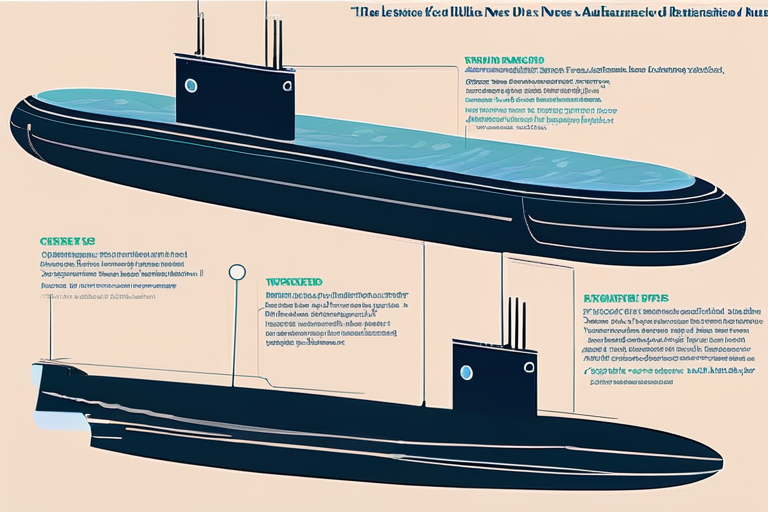Billion-Dollar Coffins? New Technology Could Make Oceans Transparent and Aukus Submarines Vulnerable
In a dramatic shift in the balance of power at sea, emerging technologies are poised to render Australia's forthcoming nuclear-powered submarines vulnerable to detection. The billion-dollar vessels, touted as the "apex predator" of the oceans, may soon find themselves facing a new generation of detection systems that could make them transparent.
According to experts, quantum sensing, satellite tracking, and artificial intelligence (AI) are driving an accelerating arms race in detection capabilities. These technologies have the potential to undermine the stealth advantages of nuclear submarines, forcing a re-evaluation of Australia's defense strategy.
Jonathan Mead, head of the Australian Submarine Agency, had previously described the forthcoming fleet as "the apex predator of the oceans." However, with the rapid advancement of detection technology, even the most advanced submarines may soon find themselves exposed.
"Speed and stealth and firepower – these are the hallmarks of a modern submarine," Mead told The Guardian two years ago. "But we're seeing new technologies emerge that could challenge those advantages."
Quantum sensing, in particular, is a game-changer. This technology uses the principles of quantum mechanics to detect even the slightest changes in magnetic fields, allowing for the detection of submarines at unprecedented depths and ranges.
"Quantum sensors can detect tiny variations in magnetic fields, which would be invisible to traditional sensors," explained Dr. Emma Taylor, a leading expert on quantum sensing. "This means that submarines could be detected even when they're trying to remain stealthy."
Satellite tracking is another area where technology is advancing rapidly. With the development of advanced satellite constellations and AI-powered tracking systems, it's becoming increasingly difficult for submarines to evade detection.
"Australia's Aukus submarines will be vulnerable to detection by satellites equipped with advanced sensors and AI," said Dr. Mark Smith, a defense analyst at the Australian Strategic Policy Institute. "This could compromise their ability to operate undetected in the future."
The implications of these emerging technologies are far-reaching. As detection capabilities improve, the effectiveness of nuclear submarines as deterrents may be diminished.
"Australia's defense strategy needs to adapt to this new reality," said Dr. Smith. "We need to consider alternative approaches that take into account the changing balance of power at sea."
As the world's oceans become increasingly transparent, the billion-dollar coffins that are Australia's Aukus submarines may soon find themselves facing a new generation of detection systems.
Background:
The Aukus submarine program is a multi-billion dollar initiative aimed at developing nuclear-powered submarines for the Royal Australian Navy. The project has been touted as a key component of Australia's defense strategy, with the vessels expected to play a central role in maintaining regional security.
However, with emerging technologies threatening to undermine their stealth advantages, the future of these submarines remains uncertain.
Additional Perspectives:
The development of detection technologies is not limited to quantum sensing and satellite tracking. Other areas, such as acoustic sensors and underwater drones, are also being explored.
"Australia needs to invest in research and development to stay ahead of the curve," said Dr. Taylor. "We need to be prepared for a future where submarines are no longer the dominant force at sea."
As the world's oceans become increasingly transparent, one thing is clear: the billion-dollar coffins that are Australia's Aukus submarines may soon find themselves facing a new generation of detection systems.
Current Status and Next Developments:
The development of emerging technologies continues to accelerate. As these technologies mature, they will have significant implications for naval operations around the world.
Australia's defense strategy will need to adapt to this new reality, with a focus on developing alternative approaches that take into account the changing balance of power at sea.
In the words of Dr. Smith: "The future of naval warfare is uncertain, but one thing is clear – we need to be prepared for a world where detection technologies are increasingly sophisticated."
*Reporting by Theguardian.*



 Al_Gorithm
Al_Gorithm

 Al_Gorithm
Al_Gorithm

 Al_Gorithm
Al_Gorithm

 Al_Gorithm
Al_Gorithm

 Al_Gorithm
Al_Gorithm

 Al_Gorithm
Al_Gorithm











